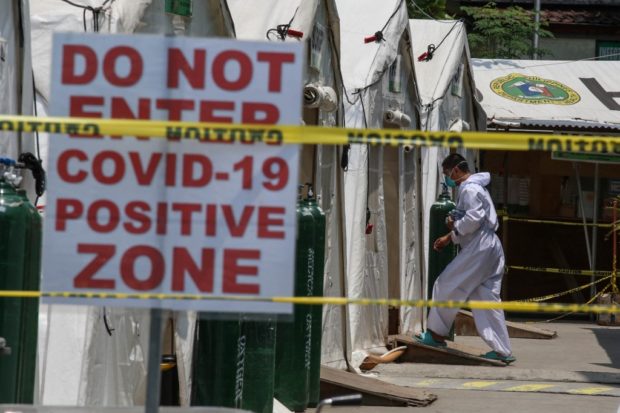Delta variant cases almost doubled overnight to 216, with 97 new cases — DOH

FILE A man wearing personal protective equipment walking into a makeshift ward built for COVID-19 patients at a hospital in Manila. (Photo by JAM STA ROSA / AFP)
MANILA, Philippines — The Department of Health (DOH) reported 97 additional cases, including three deaths, of the Delta variant of COVID-19, bringing the total cases of the highly transmissible variant in the country to 216.
The DOH said that of the 97 new cases, 88 are local cases and six are Returning Overseas Filipinos (ROF). This means that the number of cases almost doubled, with 119 cases recorded as of Wednesday.
Health authorities are still trying to verify if the three other cases are ROFs or local cases.
“Of the six ROFs, two were from seafarers of MT Clyde and Barge Claudia, currently anchored off in Albay, and four were from crew members of MV Vega that arrived from Indonesia,” a statement from the DOH said.
Of the 97 Delta cases, 94 have been tagged as recovered and three were fatalities, according to the health department.
The DOH said it is coordinating with concerned local government units to determine other information, including the origin of exposure and vaccination status of the new cases.
Health experts earlier noted the Delta variant, first detected in India, is believed to be 60 percent more transmissible than the Alpha variant from the United Kingdom. A patient with the Delta variant is said to be capable of infecting up to eight individuals.
Other variants
Meanwhile, the DOH also reported 83 more cases of the Alpha variant, 127 cases of the Beta variant from South Africa, and 22 more cases of the P.3 variant first detected in the Philippines.
Of the additional Alpha cases, 68 are local cases while 15 are still being verified if they are local or ROF cases.
LOOK: Breakdown per region of cases of COVID-19 variants in the country. @inquirerdotnet pic.twitter.com/N7L2adtz5f
— Cathrine Gonzales (@cgonzalesINQ) July 29, 2021
Based on available data, one has died while 82 have been tagged as recovered. The total Alpha variant cases in the country is now 1,856.
Of the new Beta variant cases, 106 are local cases and 21 are being verified if they are local or ROF cases. According to DOH, one case remains active, 121 have been tagged as recovered, three have died, and the outcomes of two cases are currently being verified. The total Beta variant cases in the country is now 2,146.
On additional P.3 variant cases, 10 are local cases. The DOH said it is still verifying if the 12 other cases were detected locally or from ROFs. All cases have been tagged as recovered, according to DOH.
“Following the detection of additional cases with variants of concern, it is imperative for local government units to immediately crush clusters of infection and observe increases in cases in their respective jurisdictions to reduce transmission,” the DOH stressed.
The department said this can be done through active case finding, detecting and isolating cases to less than five days, tracing close contacts of suspected, probable, and confirmed cases within 24 hours of detection, and implementing more targeted granular lockdowns.
Intensified implementation of health protocols, stricter border control should likewise be observed, added DOH.
Higher risk
With the detection of more Delta variant cases, the DOH further stressed the importance of vaccinating senior citizens and persons with comorbidity since they are at higher risk for severe COVID-19 and death.
As of Wednesday, experts from OCTA Research said that seven percent of the country’s COVID-19 cases could possibly be cases of the Delta variant, as they reiterate call for a more stringent early lockdowns to stem the imminent spread of the variant.
OCTA Research fellow Guido David noted that the current genome sequencing efforts do not reflect the actual numbers of the COVID-19 variant cases in the country.
The DOH earlier said it is conducting a “purposive” sampling of COVID-19 cases for genome sequencing, taking samples mostly from areas seeing an increase in cases to see if it is caused by the variants.
“The Department of Health would like to reiterate that whole genome sequencing is conducted to guide the overall response strategies of the government and to determine if variants are causing spikes in cases, and thus should not be used as point-of-care strategies,” it added.